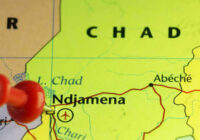Across Africa, the US military operates in the shadows.
In October, four American soldiers were killed by Islamist fighters in an ambush near the Niger-Mali border. The incident soon brought media attention to the troops stationed there, yet most of this was focused on Donald Trump’s handling of a call to a widow of a fallen soldier. One of the biggest questions left untouched by news outlets is why the US is fighting in Niger in the first place.
The Bush administration increased its involvement in the Middle East and North Africa after 9/11. This led to the launch of the Pan Sahel Initiative as the war on terror expanded beyond Afghanistan. Despite these efforts, terrorist organizations like al-Qaeda in the Islamic Maghreb flourished across the region. This prompted Washington to double its efforts under the United States Africa Command, or AFRICOM, which began operations in 2008 to oversee US military cooperation with 53 African nations.
In 2012, a conflict erupted in Mali when ethnic Tuaregs seized territory in the country’s north. The rebellion was soon overpowered by hardline Islamist groups, prompting French intervention. This was followed by a deployment of 100 US troops by then-President Barack Obama.
In the end, an ongoing partnership was formed. There are currently over 800 American troops based in Niger — and over 6,000 throughout Africa — with plans for a $100-million drone base in Agadez.
As poverty levels remain high and governance low, the climate is rife for radicalization and the creation of more safe havens for terrorist groups. Meanwhile, West Africa is at risk of becoming the new frontline for the war on terror. American presence in the region, therefore, is unlikely to decrease any time soon, and there is a need for transparency in US military operations.
*Watch the video above by Now This to find out more about US military operations in Africa.
The views expressed in this article are the author’s own and do not necessarily reflect Fair Observer’s editorial policy.
Photo Credit: BOATFOTO / Shutterstock.com
Support Fair Observer
We rely on your support for our independence, diversity and quality.
For more than 10 years, Fair Observer has been free, fair and independent. No billionaire owns us, no advertisers control us. We are a reader-supported nonprofit. Unlike many other publications, we keep our content free for readers regardless of where they live or whether they can afford to pay. We have no paywalls and no ads.
In the post-truth era of fake news, echo chambers and filter bubbles, we publish a plurality of perspectives from around the world. Anyone can publish with us, but everyone goes through a rigorous editorial process. So, you get fact-checked, well-reasoned content instead of noise.
We publish 2,500+ voices from 90+ countries. We also conduct education and training programs
on subjects ranging from digital media and journalism to writing and critical thinking. This
doesn’t come cheap. Servers, editors, trainers and web developers cost
money.
Please consider supporting us on a regular basis as a recurring donor or a
sustaining member.
Will you support FO’s journalism?
We rely on your support for our independence, diversity and quality.






